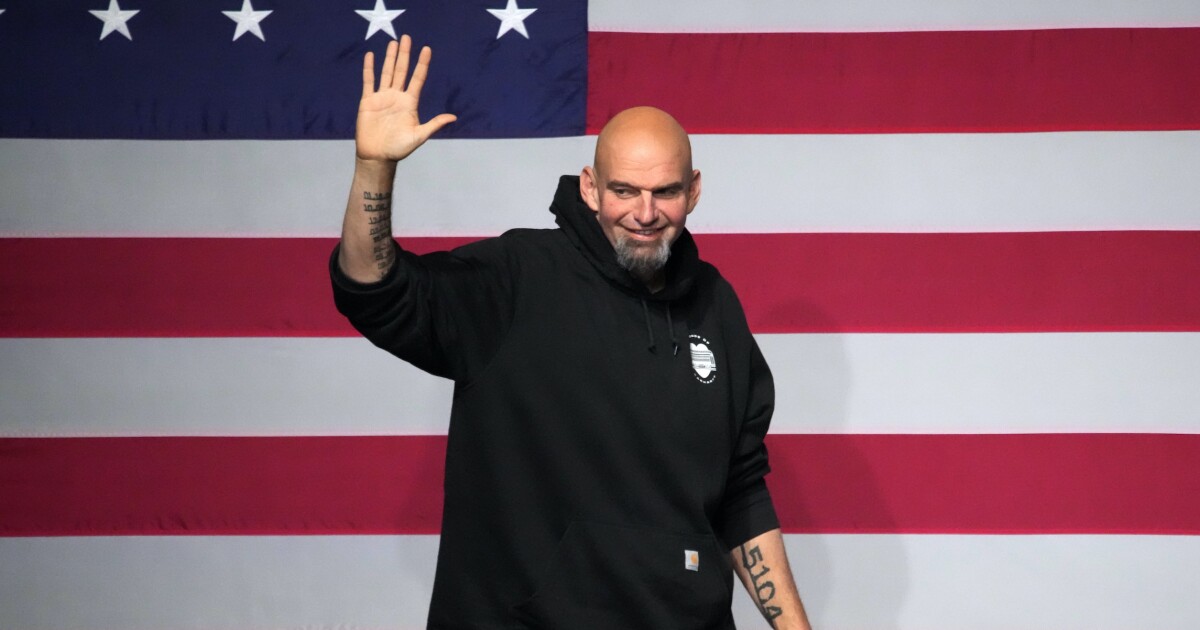

ATLANTA — The Senate majority hung in the balance Tuesday night as Democrats were proving more resilient than predicted, with votes that might yet swing the chamber to Republicans still being tallied in key battleground states.
In Pennsylvania, Lt. Gov. John Fetterman (D) defeated Dr. Mehmet Oz (R), flipping a Republican-held seat and giving Democrats some cushion in their bids to defy the odds and preserve their 50-seat Senate majority. Oz’s loss in the Keystone State, along with Sen. Maggie Hassan (D) winning reelection in New Hampshire, Sen. Michael Bennet (D) winning another term in Colorado, and Sen. Patty Murray (D) holding on in Washington state, were major blows to Republican hopes of capturing the Senate and winning a decisive majority.
In Georgia, Republican challenger Herschel Walker held a razor-thin lead early Wednesday morning, with more votes yet to count. But Sen. Raphael Warnock (D-GA) was threatening to push Walker into a runoff, overcoming stiff political headwinds from President Joe Biden’s low job approval ratings and Gov. Brian Kemp’s (R) comfortable victory over Democrat Stacey Abrams.
Results were still pending in Arizona and Nevada, where Sen. Mark Kelly (D-AZ) and Sen. Catherine Cortez Masto (D-NV) were facing tough challenges that afforded Republicans a path to the Senate majority. But the red wave the GOP was predicting, one that some Republicans were predicting would win the party 54 or 55 Senate seats, was failing to materialize as the night wore on. At midnight Wednesday, Senate Democrats still had an opportunity to preserve a 50-seat majority that rests on Vice President Kamala Harris’s tiebreaking vote.
From Washington state to Arizona, Georgia to New Hampshire, and points in between, incumbent Democrats were feeling the heat from Republican challengers heading into Election Day. They had closed the gap in public opinion polls as voters expressed disappointment with Biden’s leadership and anxiety about skyrocketing inflation, rising crime, and the general direction of the country. But in interviews with the Washington Examiner, Democratic field volunteers knocking on doors and making phone calls said their voters were energized and likely to vote in large numbers.
“I feel good, you know?” said Dylanda Young, 54, a Warnock supporter who attended a campaign rally for the senator in Macon, Georgia, on the eve of the election. “I’ve been out canvassing, I’ve been out holding signs, and I’ve been getting a good vibe from everyone.”
TIM SCOTT HINTS AT PRESIDENTIAL RUN DURING SENATE VICTORY SPEECH
Just after midnight, veteran conservative activist Ralph Reed, speaking on behalf of the Walker campaign, conceded to the Republicans still gathered inside a hotel ballroom for the former professional football player’s election night party that no victory would be declared at the event. It was a stark reversal from Monday when Walker promised supporters gathered for his final campaign rally that there would be no runoff.
“It is going to be a very long night,” Reed said. “Here is the good news: We are hitting all of our projections.”
In Nevada, where GOP insiders have long believed Republican Adam Laxalt, the former state attorney general, presents the party with its most likely path to 51 votes, polls showed he was poised to oust Cortez Masto. The contest could be ground zero for Senate control and decide whether Senate Majority Leader Chuck Schumer (D-NY) is re-upped for another term or whether Senate Minority Leader Mitch McConnell (R-KY) takes the reins.
Surveys further revealed Laxalt was benefiting from a historic uptick in support from Hispanic and other nonwhite voting blocs. Indeed, some GOP strategists in the Silver State projected Hispanic support for the party’s ticket could top 40%, making Laxalt difficult to beat. But again, Democratic activists in Nevada said what they were experiencing on the ground was something different than what the polls indicated.
“I’m not” concerned about the polls, Maria Prentice, 67, a longtime Hispanic Democratic activist and Cortez Masto supporter, said, adding, “I’m very positive” about the senator winning reelection.
Republican optimism about their Senate prospects was understandable. Several obstacles appeared to be blocking the Democrats’ bid to retain control and preserve at least one base of power for their party on Capitol Hill as voters headed to the polls Tuesday after weeks of early, in-person, and mail-in balloting. Chief among them was the 2022 electoral map.
Republicans were playing defense in just one battleground, Pennsylvania, where Sen. Pat Toomey (R-PA) is retiring. In every other contested state, Republicans were on the march, headed toward victory in GOP territory while threatening to turn blue seats red.
Specifically, Republicans were cruising in open seats they were defending in North Carolina and Ohio — and in states where the party’s incumbents, Sen. Marco Rubio (R-FL) and Sen. Ron Johnson (R-WI), were running for reelection. That was to be expected in a cycle that saw a Republican wave begin to build as early as November 2021, when now-Virginia Gov. Glenn Youngkin (R) captured a state Biden had won by 10 percentage points one year earlier.
CLICK HERE TO READ MORE FROM THE WASHINGTON EXAMINER
What Democrats did not expect was to be looking over their shoulder in blue strongholds like Colorado and Washington state.
Bennet was being pushed by centrist GOP challenger Joe O’Dea, and Murray in Washington state was on the ropes versus hard-charging Republican Tiffany Smiley. The GOP last won a Senate race in Washington state in 1994, but Smiley essentially declared victory before Election Day in a memo issued by her campaign cautioning that ballots in Washington state, cast strictly through the mail, would take several days to count.
But both contests were called for the Democrats on the early side Tuesday evening. “I think we’re going to be really successful Tuesday night,” Murray told the Washington Examiner on Friday. Turns out, she was right.






